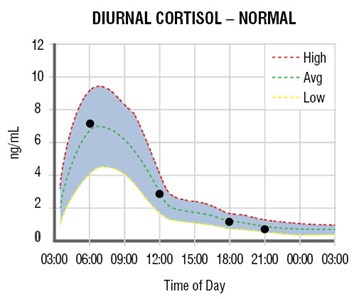Cortisol
What is cortisol?
Cortisol is a hormone synthesized and secreted by the adrenal glands of the kidneys that plays a major role in regulating stress, metabolism, and immunity. It follows a diurnal rhythm that is affected by sleep- naturally rising in the early morning, peaking around 30 minutes after waking up, and subsequently falling in the evening.
Why is it included in the Balance axis?
High cortisol levels are an indicator of acute (sudden), chronic (long-term), and/or traumatic (life-threatening) stress. Secondary factors associated with mental stress include alcohol drinking, smoking, a lack of exercise, inadequate sleep, and poor nutrition. Over time, prolonged high levels of cortisol (Cushing's disease or hypercortisolism) can lead to weight gain, fat redistribution, poor sleep, a lowered immune system, and increased inflammation. Low levels might indicate poor adrenal function or Addison's disease.
How can I better understand my fingerprick results?
- Peaks in the morning between 6 am - 8 am: 10-20 ug/dL
- Falls in the evening around 4 pm: 3-10 ug/dL
While levels in the lower range are better for inflammation, morning cortisol levels under 3 ug/dL may indicate adrenal insufficiency. Cortisol levels consistently above the normal range may indicate Cushing's disease which could point towards the presence of tumors. Keep in mind that certain medications can alter cortisol production, so it is important to talk to your doctor if you are concerned with your levels.
How does a 3-Point Saliva test differ?
The three-point cortisol test involves collecting saliva at three different times of the day (morning, afternoon, and night). Although it is expected to see natural variations, atypically high or low results at these specific times may indicate an adrenal gland disorder. Because saliva is convenient to collect, the 3-point salivary cortisol test may be more beneficial for those who are looking to confirm the presence of abnormalities or underlying diseases through repeat testing throughout the day.
Ultimately, the main difference between the saliva and blood tests is that the three-point test is more diagnostic in nature, especially for conditions that affect cortisol rhythm, while the fingerprick test is more suited for general monitoring.
What lifestyle changes can help regulate my cortisol levels?
If your cortisol levels are on the higher side, studies suggests the following interventions may help with regulation:
- Herbs and natural supplements such as ashwagandha, Rhodiola, lemon balm, and chamomile
- Aim for 8 hours of restful sleep (avoid caffeine after midday, wear blue-light blocking glasses, put the screens away before bed)
- Spend more time in nature
- Practice yoga, tai chi, qi gong, and other mindfulness meditation and breathing exercises
- Foods such as dark chocolate, garlic, fermented foods (kimchi, yogurt), and plants high in vitamin C (oranges, broccoli)
- Surround yourself with healthy relationships (pets are a plus!)
If your cortisol levels are on the lower side, studies suggests the following interventions may help with regulation:
Where can I learn more?
Cleveland Clinic - How to Reduce Cortisol and Turn Down the Dial on Stress
Huberman Lab Video/Podcast - Tools for Managing Stress and Anxiety
DISCLAIMER: IF YOU ARE CONCERNED WITH ANY OF YOUR RESULTS, PLEASE CONSULT WITH YOUR PHYSICIAN.




